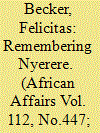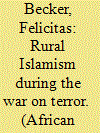|
|
|
Sort Order |
|
|
|
Items / Page
|
|
|
|
|
|
|
| Srl | Item |
| 1 |
ID:
119119


|
|
|
|
|
| Publication |
2013.
|
| Summary/Abstract |
This article examines the changing uses of political rhetoric around the burial of Julius Nyerere in 1999. It argues that the ruling party uses rhetoric as a means of 'soft power', but also documents how this rhetoric, though geared towards legitimizing Nyerere's successors, employed tropes that were rejected by some people and were used by others to critique leaders who were perceived to lack the selfless integrity attributed to Nyerere. The article compares funerary songs by a government-sponsored band, popular at the time of Nyerere's death, with memories of Nyerere in rural areas in the early to mid-2000s. While the image of Nyerere in the funeral songs as a benign family patriarch writ large still persists, it coexists with strongly divergent constructions of Nyerere as an authoritarian ruler or a self-seeking profiteer. Moreover, the 'official', benign Nyerere has been employed not only by government and party faithful, but also by striking workers, opposition politicians, and critical newspapers as a measure of the shortcomings of his successors. The invocation of Nyerere as a paragon of an endangered ideal of virtue in public office indicates widespread anxieties towards a state that often disappoints but occasionally delivers, in unpredictable turns, and the limits of the government's ability to shut down dissent.
|
|
|
|
|
|
|
|
|
|
|
|
|
|
|
|
| 2 |
ID:
075067


|
|
|
|
|
| Publication |
2006.
|
| Summary/Abstract |
In the Tanzanian country town of Rwangwa, a bitter confrontation has developed between Sufi Muslims and Islamist reformers. The Islamists draw on Middle Eastern inspiration, but the conflict arises equally from local, regional and national context, and is cultural as well as religious and political. Situated in an economically and educationally disadvantaged region, access to land and trade forms the focus of conflicts between the young (Islamists) and the older (Sufis). Islamists criticize the closeness of Sufis to government, which they accuse of discrimination against Muslims. The main objects of debate, though, are ritual and scripture. The Islamists reject Sufi burial rites and appeal to their superior knowledge of the Quran to justify their stance, reinforcing and profiting from the on-going transition from orality to literacy. While mainstream Muslim observers condemn the Islamists' aggressive posturing and opposition to authority, they accept their claim to superior learning and to possession of an Islamic alternative to western notions of progress.
|
|
|
|
|
|
|
|
|
|
|
|
|
|
|
|
| 3 |
ID:
185668


|
|
|
|
|
| Summary/Abstract |
For a time, Tanzania enjoyed a reputation for mostly free elections and public debate. But after President John Magufuli was elected in 2015, he introduced measures to stifle the media and tilt the electoral playing field in favor of the longtime ruling party. The turn toward authoritarianism is not due to any one personality or stereotypical “mad dictator,” however (notwithstanding Magufuli’s pandemic denialism, which may have cost him his life). It is part of the legacy of the early postcolonial period and the revered founding president, Julius Nyerere, who set the foundations of one-party rule and wielded the rhetoric of economic nationalism.
|
|
|
|
|
|
|
|
|
|
|
|
|
|
|
|
|
|
|
|
|